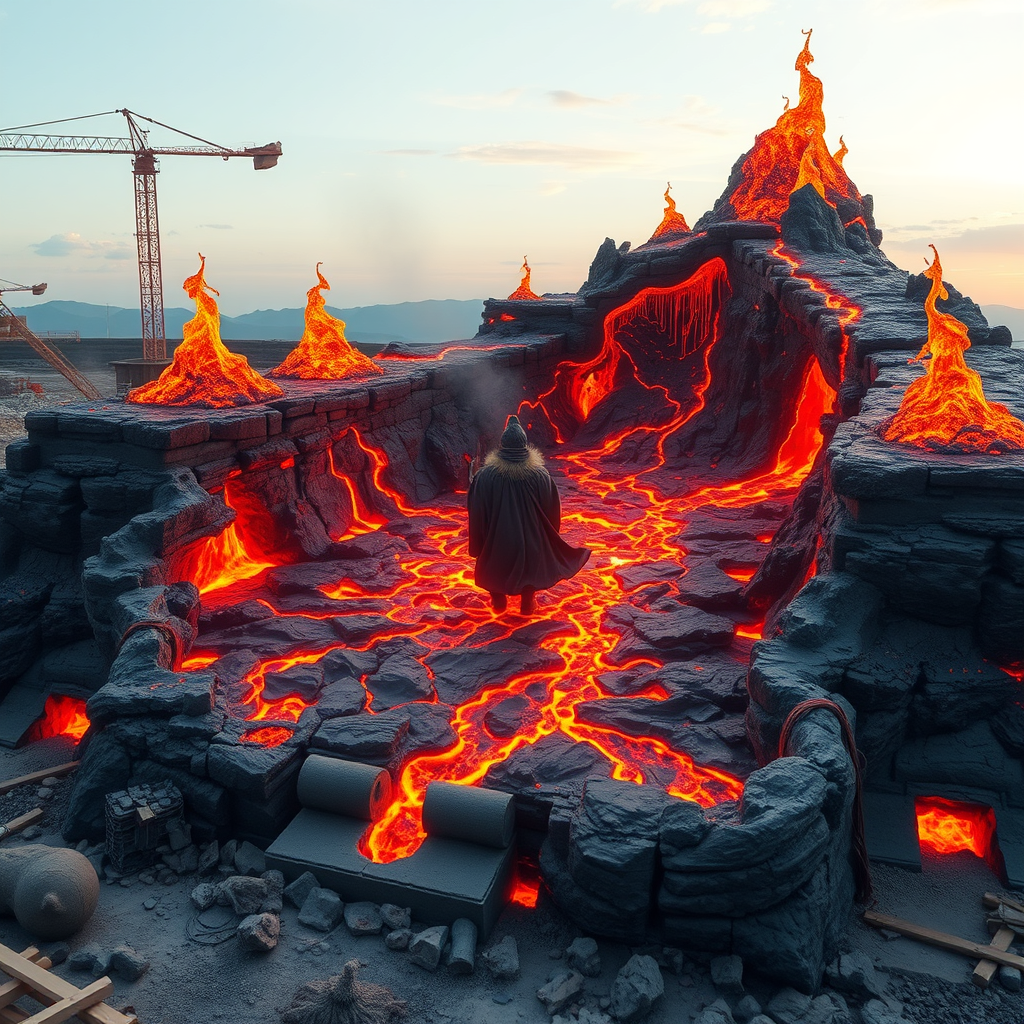so i had a dream where a group and i were magically summoning like, liquid stone and by-hand forming it into walls–this is clearly half-baked and inefficient–so how would YOU make or enhance construction processes using magic, sci-fi technology, or fictional materials?
In the setting I’m working on, one of the ancient elven technologies they reverse-engineered is something they call “gossamer looms.” Gossamer is the name given to the rose-colored threads of ethereal pseudo-matter that can be arranged in any shape imaginable to serve as the framework for fusing materials together. It’s frequently combined with their illusory projection tech (magic mirrors) to do rapid construction with pre-existing templates. Feedstock (typically gravel, sand, sawdust etc) is drawn through a “loom” which can vary in size from handheld to so massive they require multiple levitation engines in order to be used at all. This feedstock shoots along the rose threads of light suspended in air to fuse to whatever template has been drawn in the air, either freehand or pre-recorded.
How exactly do the materials fuse together? Good question. The Mages’ Guild is working on that one. But they have more pressing concerns, like the eternal maelstrom of lightning that they’re barely containing following that storm bomb during the big war, or how to cleanse that peninsula where every dead thing that falls there rises up and sprints in the direction of the closest living thing to kill it.
i’m imagining this somewhat like a highlight box for placing objects in a game, but integrated into the setting, cool stuff. gravel sand and sawdust don’t seem like the most sturdy of materials though, how does it become structurally sound? must it even or can you design a gossamer that immediately collapses
Still figuring those things out tbh but when the material fuses together into a solid object, so the granite dust becomes a solid block of it, sawdust becomes something like hyper-condensed super sturdy particle board etc.
Structurally unsound? You got it. Even a building made of solid stone can collapse under its own weight if the architect is a dipshit.
That seems pretty efficient compared to bricklaying. If fine artistry in the walls (engravings etc.) are wanted, you probably would do it like that, by hand. Otherwise I imagine maybe wizard-created golems do most of the manual labor of forming the stone into wall shapes, and then artists are tasked with making them look pretty in the finer details?
fine artistry in the walls
hmmmm that’s an interesting thought, as opposed to ornamentation on top of structurally ‘normal’ walls & features, a culture that designs everything about a building with the eye of a sculptor in stone. that’d be pretty alien
maybe the bricks are alive and lay themselves?
i cant find an image on google but the LANCER rpg rulebook has art of a 6 legged, 2 armed mech that carried a giant 3d printer nozzle to print buildings with (the building looked kinda like soft-serve ice cream or frozen yogurt) and i thought that was really cool.
ur liquid stone thing reminds me of how the Eldar in warhammer 40k ‘sing’ buildings into shape with a material called Wraithbone. i think using magic to approximate modern construction methods is pretty cool, magical liquid stone is basically proto-concrete. illusion magic and low-level spells/cantrips like in DnD could also be used to help with more traditional construction, like projecting a 1:1 scale blueprint on the project area or using prestidigitation cantrips to clean and style stuff.
also since another comment mentioned golems, they make an excellent fantasy construction mech (also more golems should be able to be piloted imo)
Just being able to arbitrary shrink/expand or teleport objects would have massive repercussions on how building material gets transported. For something like an eleven-story tower, instead of building one floor at a time, craftsmen would work on all floors simultaneously and finish the tower by shrinking/teleporting each constructed floor on top of one another. It would also have massive repercussions on how urban centers are designed. For example, waste management would look very different if you could just shrink waste down to an arbitrary size and teleport the shrunken waste to the center of the Sun. Piles of waste material like sawdust or tailings could be shrunken into a manageable size and teleported into a cavity of a giant cube made out of a magical durable material like adamantium. Once the shrink spell wears off, the waste pile would try to expand back to its normal size, but since it’s stuck in a cavity of a magical material that refuses to budge, the waste pile would forcefully compress itself until it’s an ultradense block with the exact dimensions as the cavity. The ultradense block could be teleported out of the cube and used as building material.
Prisons would just be a refri of human cells.
Liquid stone sounds like magic concrete, which you know what, sounds awesome.
what if the liquid stones were also alive, very jolly, very horny, loved becoming solid, and made lots of innuendo about becoming hard for terresties
Um, the “world building = the author’s fetish” thread is somewhere else, I think.
Jk, that sounds like a fun setting, and an even rowdier construction site. Pretty much you would have to organize a sick party/orgy in order to build a house.
Just creating a world where stone is a much easier material to create and use would be fun to explore. It would actually have far-reaching consequences re: the political economy.
you’d have to invent whole new reasons to get a bunch of hunks in chains and loincloths sweating in the hot sun!
maybe the religiously significant rock is still too heavy, or the easy-to-move methods remove/taint/curse the supernatural good stuff the religion needs/likes about it.
For some other fancy rock or rare flora like the humies normally do.
I guess I would do something I could wrap my head around, but also very portable.
like some kind of device that deconstructs/recycles anything into anything else, but for construction materials it would make building blocks/forms out of whatever material one wanted, colored/stained etc. and some kind of universal adhesive with supreme bonding properties that could bind anything to anything in seconds when “cured” by some device, but can also be uncured through an even more deliberate action for safety reasons. the device would have preprogrammed forms / materials like insulated exterior walls, concrete, simulated wood, glass, steel/stainless, porcelain.
anyway, with that, one who could assemble lego with glue could feasibly construct anything by themselves, even.
larger communal projects more people and equipment would have larger devices capable of making larger forms, but require larger input.
the idea being that the smaller device, like would accompany them in the cargo area of a personal conveyance, and would be used by a colonist / homesteader to build a residence/outpost and all kinds of shit to adapt to anything, functionally and/or aesthetically. but it could also be used by somebody to just build, remodel, or otherwise maintain their own space.
this is clearly half-baked and inefficient
No it’s great! Lava hardens into rock, so if you shape/form/mould it when it is lava, then it solidifies into the shape you want.
There are lots of ways of making things that rely on the thermoplastic effect: you shape it when it’s liquid, then it hardens and you’re done.
If the wizard could bend/conjure lava into any shape, he would be a useful man to have on your construction crew.














